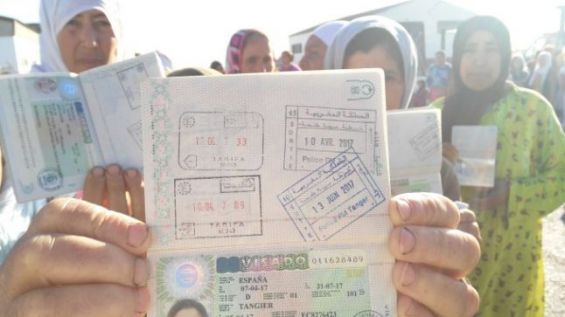Hundreds of Moroccan female farm workers have been held against their will in the farm where they work by their managers for wanting to report alleged sexual harassments, says Le Desk quoting Spanish online newspaper La Mar de Onuba.
The women were kept in the farm, Sunday 3rd of June, in order to be sent back home in a bus tomorrow, the same source explains.
These Moroccan nationals working for Doñaña 1998 d’Almonte were asked, this morning, to board a bus and return to their country as soon as possible, although their work contracts will expire by next week, says La Mar de Onuba.
The measure was taken in order to prevent these workers from exposing the alleged sexual abuses they may have been subjected to. This was confirmed by the lawyer of the Andalusia workers syndicate, who told the same source that they were prevented from «ratifying the allegations to the investigating judge following the complaint they lodged yesterday to the Guardia Civil».
According to the lawyer these workers were also «planning to report these allegations to the Labor Inspectorate Monday morning», reports La Mar de Onuba.
“¿Dónde voy yo ahora? El jefe me obliga a salir de aquí. Hace tiempo que no me pagan. ¿Dónde voy yo ahora?”Las #mujeres denuncian y graban el momento en el que la #GuardiaCivil llega durante la expulsión forzosa de las trabajdoras #Marruecos de la finca Doñana 1998 en #Huelva pic.twitter.com/pHLid3oCJE
— Lucía Muñoz Lucena (@luciamunozluc) 3 juin 2018
The Guardia Civil have prevented the buses from leaving for Morocco and sent the women, who were fired by the above-mentioned company back to where they were working.
This atypical conflict seems to be a reaction to a collective complaint lodged last Friday by a hundred women, said the same lawyer.
Speaking to La Mar de Onuba, the company in question denounced the incident saying that the temporary female workers’ contracts have expired today and that they have been notified about their return to Morocco beforehand.
Meanwhile, the Guardia Civil said that there has been no problem of public disorder today, without explaining why its elements were present on-site.
For the record, four Moroccan women, working in a Huelva strawberry farm, told the Spanish authorities that they had been sexually abused by their manager, says El Mundo quoting a statement issued Thursday by the prosecutor’s office in Andalucía.
Reporting the alleged abuses to the National police and the Guardia Civil, the four women have accused the same person, who works as a manager in a farm located in Moguer, a small city located in the province of Huelva.
Held in Huelva
The Andalusia prosecutor asked strawberry farm-workers to report potential abuses they may be facing. The same statement was relayed Wednesday by Moroccan Minister of Employment and Vocational Training Minister Mohamed Yatim who called Moroccan women working in strawberry farms in Huelva (Spain) to not keep quiet about alleged sexual abuses.
Yatim's statement, however, comes as his department denied in two previous communiqués the outcome of an investigation published by Buzzfeed News in April. The latter featured the accounts of several Moroccan women working in Huelva's strawberry farms who claimed having been sexually assaulted, abused, raped and blackmailed by their managers.
In previous articles published by Yabiladi on the matter, the ministry, in the person of its secretary general, confirmed that none of the Moroccan women had ever lodged a complaint to the authorities, reporting abuse. The ministry stuck to its guns even after sending a delegation to Spain to inquire on the conditions under which these women work.
On Wednesday, an authorized source at Morocco's consulate in Seville told Yabiladi that Moroccan temporary workers in Huelva phoned the consulate to report their managers' abuse, after informing the Spanish authorities.
According to the same source, these women notified the consulate after several articles emerged in the last weeks revealing their struggles.
In order to gather more information on the matter, Yabiladi called Wednesday Mohamed Yatim but received no answer.





 chargement...
chargement...













